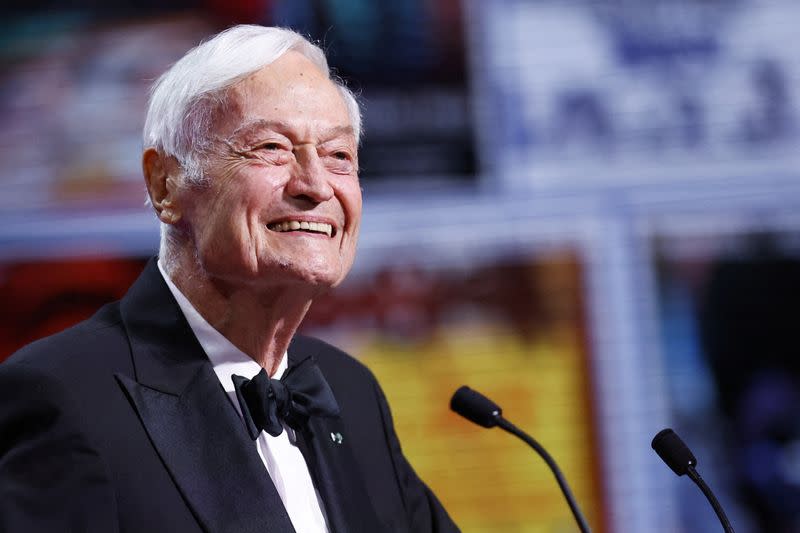Roger Corman, influential B-movie king who nurtured great directors, dies at 98

- Oops!Something went wrong.Please try again later.
- Oops!Something went wrong.Please try again later.
- Oops!Something went wrong.Please try again later.
- Oops!Something went wrong.Please try again later.
- Oops!Something went wrong.Please try again later.
By Will Dunham
WASHINGTON (Reuters) - Low-budget cinema maestro Roger Corman, who cranked out hundreds of outrageous films over six decades and helped launch the careers of acclaimed directors Martin Scorsese, Francis Ford Coppola, James Cameron and Ron Howard, died on Thursday at age 98, family members said.
Corman, a producer and director hailed as the "king of B movies," died at his home in Santa Monica, California, his wife and daughters said in an post on his Instagram account late on Saturday without giving the cause of death.
"It is with profound sadness, and boundless gratitude for his extraordinary life, that we remember our beloved husband and father, Roger Corman," his wife Julie and daughters Catherine and Mary, said in the post.
"His films were revolutionary and iconoclastic, and captured the spirit of an age," they wrote.
Corman was given an honorary lifetime Academy Award in November 2009 for his "rich engendering of films and filmmakers."
"Roger, for everything you have done for cinema, the academy thanks you, Hollywood thanks you, independent filmmaking thanks you," Academy Award-winning filmmaker Quentin Tarantino told Corman at his Oscar ceremony. "But, most importantly, for all the weird, cool, crazy moments you've put on screen, the movie lovers of planet Earth thank you."
Corman's work - he produced more than 300 films and directed about 50 - was filled with those weird, cool and crazy moments. The movies were shot swiftly on the cheap and only a handful lost money.
They covered genres including sci-fi, horror, biker films, rebellious teen fare, Edgar Allan Poe tales and more. Their titles were not exactly subtle - "Attack of the Crab Monsters" (1957), "The Saga of the Viking Women and Their Voyage to the Waters of the Great Sea Serpent" (1957), "The Brain Eaters" (1958), "Teenage Cave Man" (1958), "A Bucket of Blood" (1959), "Creature from the Haunted Sea" (1961), "Bloody Mama" (1970), "Gas-s-s-s" (1970), "Galaxy of Terror" (1981) and "Piranhaconda" (2012).
Past age 90, he was still prolific, producing films with titles such as "Cobragator" and "Death Race 2050."
"I believe to be successful over the long run, unless you're a Federico Fellini or an Ingmar Bergman or a true genius in filmmaking, you have to understand that you're working in both an art and a business," Corman told a pop culture website in 2010.
He gave early career breaks to future stars including Jack Nicholson, Robert De Niro, Sylvester Stallone, Sandra Bullock, Talia Shire, William Shatner, Peter Fonda and Dennis Hopper.
But he was best known for nurturing directors. As a frugal producer, Corman hired promising young filmmakers who could work on a shoestring budget, launching their careers.
Before "Raging Bull," Scorsese directed Corman's "Boxcar Bertha" (1972). Before "The Godfather," Coppola directed "Dementia 13" (1963) for Corman. Jonathan Demme of "The Silence of the Lambs" fame directed Corman's "Fighting Mad" (1976). Howard directed "Grand Theft Auto" (1977) for Corman before "A Beautiful Mind." All four men went on to best director Oscars.
Also, Peter Bogdanovich directed Corman's "Voyage to the Planet of Prehistoric Women" (1968) before making "The Last Picture Show," and Cameron was art director for Corman's "Battle Beyond the Stars" (1980) before "Titanic."
Sometimes his proteges thanked Corman by giving him cameo roles, such as the FBI director in "The Silence of the Lambs" and a congressman in "Apollo 13."
'I PROMISE YOU'
At Corman's 2009 Oscar ceremony, Howard fondly recalled getting a shot to make his directorial debut with "Grand Theft Auto" at a time when he was viewed as a lightweight TV sitcom actor. Howard said he complained to Corman about not getting sufficient resources.
Corman did not cough up more money, Howard said, but told him: "I promise you this: If you continue to do a good job for me on this picture, you'll never have to work for me again."
No one would argue that the movies Corman produced were subtle or nuanced. Many were complete schlock, filled with crazy effects, bizarre plots, bare breasts, ridiculous monsters or women behind bars. But some had artistic merit.
He directed "The Little Shop of Horrors" (1960), filming it in just two days and one night. It featured a young Nicholson, who had impressed Corman in an acting class, and an icky plot about a lonely flower shop worker who creates a carnivorous plant that craves human flesh.
He also made several horror films in the 1960s starring Vincent Price inspired by Edgar Allan Poe stories, including "House of Usher" (1960), "The Pit and the Pendulum" (1961) and "The Masque of the Red Death" (1964).
Corman stopped directing in 1971 and focused on producing. He directed just one more film, 1990's "Frankenstein Unbound."
In contrast to his trademark low-budget stuff, Corman also dabbled in international arthouse cinema, serving as the U.S. distributor of films by fabled directors Ingmar Bergman, Federico Fellini, Akira Kurosawa, François Truffaut and more.
Corman was born on April 5, 1926, in Detroit. He graduated from Stanford University in 1947 with an engineering degree, but quit his first job as an engineer after three days and got work at the 20th Century Fox film studio as a messenger.
After a detour studying modern English literature at the University of Oxford, he returned to the United States intent upon making his mark in the film industry. The name of Corman's 1990 autobiography revealed his guiding philosophy: "How I Made A Hundred Movies In Hollywood And Never Lost A Dime."
(Reporting by Michael Martina and Will Dunham; Editing by Bill Trott and Nick Zieminski)

